On Tuesday
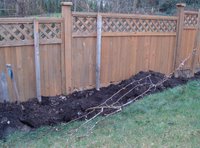 , I moved our espalier Asian Pear tree, with its 3 varieties of asian pears. It's a long story, but in short, the first landscaper planted the tree 6 inches from the fence, and the second landscaper set the posts (to which to train the 3 sets of horizontal branches) at 12 inches from the fence. So being determined to make this right, against the advice of my friends and family to just let it go, I was out there, digging. It was an overcast day, warmer than the previous day (where we saw a few perfect snowflakes landing on the ground and not melting - a real treat in Vancouver, where we are used to falling slush), with a slight mist falling. Perfect for transplanting.
, I moved our espalier Asian Pear tree, with its 3 varieties of asian pears. It's a long story, but in short, the first landscaper planted the tree 6 inches from the fence, and the second landscaper set the posts (to which to train the 3 sets of horizontal branches) at 12 inches from the fence. So being determined to make this right, against the advice of my friends and family to just let it go, I was out there, digging. It was an overcast day, warmer than the previous day (where we saw a few perfect snowflakes landing on the ground and not melting - a real treat in Vancouver, where we are used to falling slush), with a slight mist falling. Perfect for transplanting.As I suspected, moving the tree was a two-person job, but I didn't have the second person, so I did my best. I dug around the tree, working my way in toward the rootball. There were 4 or 5 anchor roots, which I was careful to sever as far from the tree as possible.
There was a healthy root ball, about 2' across, of fine roots, which were no problem to dig around. But lifting & moving the 6" proved to be no insignificant task - there seemed to be one root which anchored it in place, even after I dug completely around it. By the end of it, I was sweaty (no, not "glowing" or perspiring, this was just plain sweat!). The upside of it, was that in the process of digging, I managed to unearth about 200 shoots of horsetail which were waiting under the surface of the soil as an unwelcome spring surprise, as well as much of the network of strong roots/runners connecting them.
Sometimes I muse about how I have managed to receive both curses from the Original Sin - pain in childbirth, and toiling over the earth. After the espalier Asian Pear, I promised myself I was not going to tackle the second espalier alone - I would be smart enough to ask for help, or hire it if required.
To
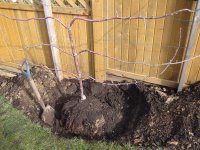 day I moved the espalier Apple tree (3 varieties of apple). So much for being smarter this time! Fortunately, this one proved to be a more manageable project. Although the rootball was larger, there were no obvious anchor roots, and only a couple dozen horsetails to distract me while digging. I was hitting more clay & rocks, but somehow I managed to unearth & move this one in about half an hour, without much sweat. Good thing, since by the end of it, a fiercely cold wind had picked up.
day I moved the espalier Apple tree (3 varieties of apple). So much for being smarter this time! Fortunately, this one proved to be a more manageable project. Although the rootball was larger, there were no obvious anchor roots, and only a couple dozen horsetails to distract me while digging. I was hitting more clay & rocks, but somehow I managed to unearth & move this one in about half an hour, without much sweat. Good thing, since by the end of it, a fiercely cold wind had picked up.I also finished the support structure, which consisted of 1 1/8" zin
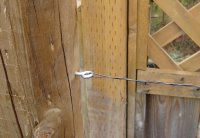 c eyelet hooks, 19 gauge black wire, and soft cloth / old nylons to train the branches to the wire. The eyelet hooks were fairly easy to attach to the posts, by hammering them partly in, then twisting them with pliers. I saved the last couple of turns for after the wire was attached, to tighten it. Many of the branches of the tree were already curved, from not being able to tie them down properly last year, so they needed to be tied in several places to try to straighten them out. I think the result is very pleasing, and will be better once I patch up the staining of the fence, and pull off those useless 2x4's (the second landscaper's approach to supporting the tree, which was completely inadequate for training in the espalier form, not too mention too close to the tree to tie the ends of the branches, even in the first year!) .
c eyelet hooks, 19 gauge black wire, and soft cloth / old nylons to train the branches to the wire. The eyelet hooks were fairly easy to attach to the posts, by hammering them partly in, then twisting them with pliers. I saved the last couple of turns for after the wire was attached, to tighten it. Many of the branches of the tree were already curved, from not being able to tie them down properly last year, so they needed to be tied in several places to try to straighten them out. I think the result is very pleasing, and will be better once I patch up the staining of the fence, and pull off those useless 2x4's (the second landscaper's approach to supporting the tree, which was completely inadequate for training in the espalier form, not too mention too close to the tree to tie the ends of the branches, even in the first year!) .The first photo is t
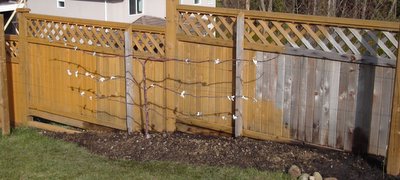 he Apple, the secon
he Apple, the secon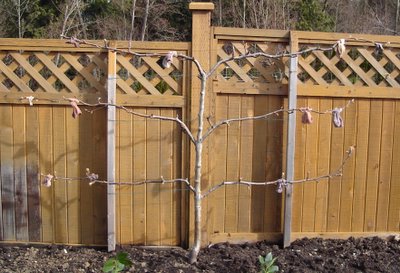 d one is the Asian Pear.
d one is the Asian Pear.

Thanks for the pictures! I just ordered an espalier apple tree and it was good to see your setup!
ReplyDeleteI bought an Asian pear tree today, it is not an espalier tree but since it has only 3 small branches, I don't see why I can't start the espalier myself.
ReplyDeleteSo I guee, 12" from the fence, then 2 posts about 3 feet aprt form the trunk, accoring to the photo ?
By the way I live in zone 5, I am not sure the kink of Asian pear tree I have, but can someone tell me to how wide and high it will grow to if not espaliered ?
Thanks.
Minh
Minh,
ReplyDeleteNot quite. 12" from the fence seems fine, allows you to get your hands behind for pruning, but still allows the tree to benefit from heat reflected from the fence. But the supports at 3' was the silly mistake of my landscaper. I set up proper posts at 8 feet on each side (full length of one fence panel), and even then, the apple has nearly reached the ends, in less than 3 years. So I wouldn't go any less than the 8'. See my later post about the espaliers - one of the posts can be seen on the very left of the top photo.